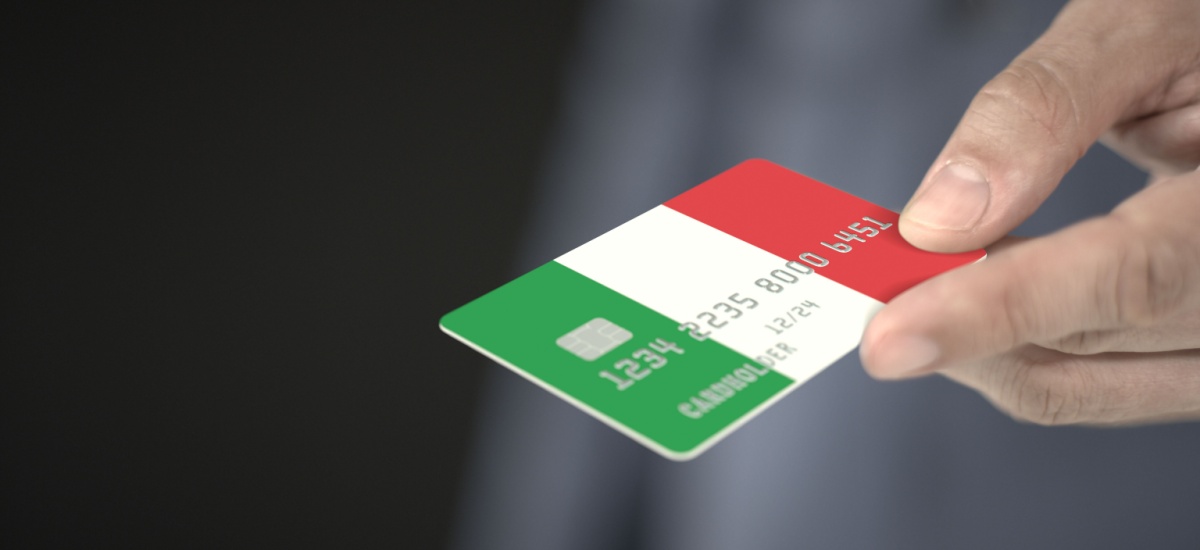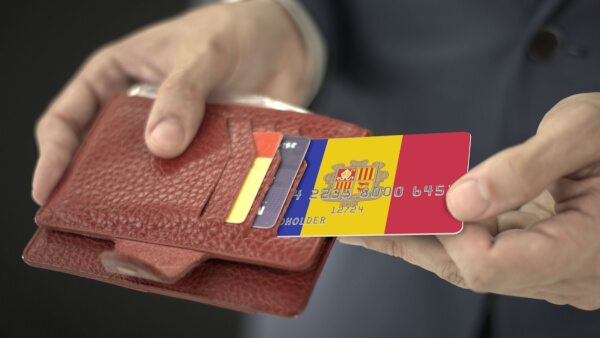How to open a UK bank account online in 2025
Check out our essential guide on how to open a bank account online, including bank types, required documents, fees, and more.

Italy is a beautiful country with a range of unique regions, all of which have something different to offer visitors and expats.
Whether you’re moving to Italy for wine, its beautiful Mediterranean coastline, the bustling fashion industry, to enjoy delicious pasta or anything in between, it won’t be hard to find a place that’s right for you.
Whichever region you move to, one of the first things you’ll need is a local bank account. But can a foreigner open a bank account in Italy, and how easy is it to do?
Read on for everything you need to know as a UK expat, including what documents you’ll need and some tips on the best Italian bank accounts for expats.
We’ll also show you a fantastic alternative to a bank for managing your money in Italy. Open a Wise multi-currency account and you’ll be able to hold and manage your money in 40+ currencies, including GBP and EUR. It’s not a bank account but offers some similar features, and your money is safeguarded.
Moving to Italy and want to take your savings with you? With Wise, you can convert money or send secure and trackable large amount transfers to Italy and 140+ countries worldwide for low fees* and mid-market exchange rates. Plus, you’ll receive dedicated support and volume discounts when sending large amounts.
➡️ Learn more about the Wise account
The majority of banks in Italy will ask for proof of residence or a local address when you apply for a bank account.
However, some banks in Italy do offer non-resident account options - these may be handy if you’re not in Italy full time. The account type to watch out for is conto corrente non residenti - often available through specialist banks which support cross border commuters.
CiviBank, for example, is one bank which has non-resident account options.¹ It mainly targets accounts at people commuting between north-east Italy and the Balkans, but it also has options for non-residents living outside of the country in other locations.¹
With some banks, you may need to visit a branch to open an account, verify your ID and present original versions of documents. So if you’re not yet living in Italy, you’ll need to schedule at least one in-person trip to get your account open.
It’s not absolutely essential to have a local bank account in order to move to Italy, and there aren’t any rules or laws which say you have to have one.
It may be possible you can get along without one for a time, especially if you can take advantage of multi-currency solutions such as the Wise account to send, spend and receive money in Italy and between countries.
But opening some kind of local or international current account will be a smart move in the long run.
Everyday expenses such as rent and bills will be more difficult to set up without an Italian bank account, as will getting paid if you’re working and any transactions relating to buying, renovating and selling property in Italy.
If you have big plans to build or renovate property in Italy, you’ll definitely need a local account to buy supplies and pay contractors.
You might be tempted to keep using your UK bank account when you move abroad. After all, it’s much easier than dealing with foreign banks and waiting for a new account to be set up.
But is it actually possible to use a UK account in Italy?
The answer to this is likely to be no, although it will depend on who you bank with back in the UK.
Some UK banks such as Barclays only let you keep your account open when living abroad under very specific circumstances. For example, if you’re a UK Crown employee or are planning to live abroad for less than 6 months before returning to the UK.²
Other banks such as Spanish-owned international bank Santander say they will continue to service accounts when the holder moves abroad.³
So if you already have a Santander account, you should in theory be able to continue using it once you’ve moved abroad. You won’t be able to open a new one though, as these are only available to permanent UK residents.
Santander does operate in Italy too, so you might be able to access branch services and ATMs.
One obstacle you may face though is the currency. If you’re using a UK bank account, it’ll likely be denominated in GBP. You’ll be spending in euros (EUR) while in Italy, so you could lose out when it comes to currency exchange.
So all things considered, it could be a smart move to open a local account once you arrive in Italy - just to make life easier for yourself.
You shouldn’t experience any problems opening a bank account in Italy as a foreign national, as long as you have the right paperwork. The country is welcoming to new arrivals, which is one of the reasons it’s such a good country to move to.
The only issue you might encounter is that not all banks will have English-speaking staff, if you do decide to apply in branch. You’re likely to have better luck at major and international banks, rather than smaller or regional ones. Otherwise, you can choose a bank that lets you open an account online.
Yes, many banks in Italy offer the option to open a current account online.
If you have the right documents, you should be able to complete the application process online or in the bank’s mobile app - providing your signature electronically.
For example, Intesa Sanpaolo lets you open an account via its mobile app. You can download the app, upload your documents and complete verification steps - all through your phone, without needing to visit the branch.⁴
You’ll just need to check whether you’re eligible for online account opening as a foreign expat. It’s likely that Italian residency, proof of a local address and an Italian tax number will be key requirements,⁵ so you might not be able to apply to open an Italy bank account from the UK - you’ll need to wait until you’ve moved.
Student accounts can be opened at many Italian banks, with account products aimed at under 18s, and those in further education.
There are also often preferential terms for people under the age of around 30, with waived fees and lower transaction costs - whether you’re a student or not.
The documents required to open a bank account in Italy will vary between banks, but generally you’ll need:⁵
To verify your identity, you’ll need to provide your valid passport or another form of acceptable photo ID like a National Identity card.
You’ll need to provide proof of an address in Italy, such as recent utility bills or a rental contract. You may also be asked for proof of your residence status, such as your visa or work permit.
This is your Codice fiscale, or Italian tax number. It acts as a form of identification for government departments, as well as services such as banks and utility companies. You can apply for one at your local municipality’s immigration desk (Sportello Unico per l’Immigrazione).
If you’re working, you might need to provide payslips, your work contract or a letter from your employer as proof of employment/income.
If you’re applying for a student account, you’ll need to provide proof of your student status - you can usually get this from your university or other educational institution.

There’s no single best bank in Italy for foreigners, but it could be a good idea to go for one of the major banks. They’ll have a good selection of accounts and a wide network of ATMs and branches. You may also find it easier to locate an English speaking member of bank staff if you’re using one of the larger banking groups.
Here’s a list of the most expat-friendly banks in Italy to check out:
Let’s take a closer look at each one.
Intesa Sanpaolo is one of the country’s largest Italian banks. It has an extensive branch network throughout the whole country, and an international presence too.
Intesa Sanpaolo offers a wide range of current and savings accounts, along with credit cards, mortgages and insurance products.
For everyday banking, you can choose between a Basic Bank Account to meet your everyday needs, or the XME Account (available in Silver, Gold or Platinum)which comes with extra features and services.
UniCredit, part of the Italian-owned UniCredit financial group, is another big name in the Italian banking market. It offers a range of current accounts and savings products.
One option to check out as a new arrival is the Conto Corrente Genius (Genius Account). It offers everything you need for everyday use, including a debit card and online/mobile banking.
The Italian postal service also provides popular banking services. This includes current accounts, credit cards, savings, insurance and pensions products.
If you open its BancoPosta account, you get the flexibility of choosing from four different account types to suit your needs. These are:
With all options, you can also manage your money however you like - at the post office, at an ATM, using online banking or the BancoPosta app.
Another bank with a strong presence on the Italian high street is Banco Nazionale del Lavoro (BNL). It’s owned by the French financial services group BNP Paribas.
Among its range of current and savings account packages is the Account BNL X, an online solution which you can customise with the products and services you need.
ING Italia is part of the Dutch owned banking group ING Group, and offers a full range of financial products in Italy. This includes current accounts, savings and investment products, mortgages and insurance options.
The bank’s Orange (Arancio) Account comes in two types - Light and Plus. Both include a debit card and have no monthly fees (for Plus, only if you pay in your salary each month). You’ll also get free cash withdrawals in Italy and Europe with the ING Orange Plus Account.⁶
Along with high-street banks, you can choose to bank online or use an alternative in Italy. These options include:
You can also check out other non-bank alternatives, which don’t have a banking licence but offer services such as accounts, payments and cards.
This includes the money services provider Wise, which has a multi-currency account, international debit card, transfer services and app available to use in Italy.
Bank accounts and banking services in Italy do come with some fees. This includes fees for transfers and monthly charges for maintaining the account.
These will vary between different banks, so you should always check the small print before signing up for an account.
But here’s an idea at what kinds of fees to expect:
| Transaction/fee type | Typical fee |
|---|---|
| Current account - monthly fee | €0⁶ to €10⁷ EUR a month (some banks waive /reduce the fee if you meet conditions such as paying in a salary) |
| ATM cash withdrawal | Usually free at your own bank’s ATM |
| Getting a debit card | Usually free |
| Domestic payments (i.e. within Italy) | Usually free |
| International payments (i.e. to the UK from Italy) | - SEPA payments (EUR payments within EEA) often free - Around €10 EUR for other transfers, but varies depending on speed, destination and payment type⁸ |
Most bank accounts in Italy come with monthly fees, although there are some free ones out there. One example is the ING Orange (Arancio) Light Current Account, which doesn’t have a monthly fee and you only pay for what you use.⁶
You might find though that with some free accounts, you end up paying extra costs for withdrawals and certain other transactions.
It’s common for student accounts to have low to no fees, and many Italian current accounts waive or reduce monthly fees if you meet certain conditions like paying in your salary each month.
As we’ve mentioned though, you may find it difficult to open any of these accounts without being an official Italian resident.
Need to manage your money in multiple currencies or send transfers back home to the UK? There are alternatives to using a bank, such as Wise.
Open a Wise account and you can convert, hold and send money in 40+ currencies (including EUR and GBP). Better still, you’ll get the mid-market exchange rate for your foreign currency transactions and only pay a small, transparent fee*.
| Here’s an overview of the main benefits of using Wise: |
|---|
|
**Investments in funds are never guaranteed and your capital can be at risk. In the UK, Interest and Stocks are provided by Wise Assets — this is the trading name of Wise Assets UK Ltd, a subsidiary of Wise. Wise Assets UK Ltd is authorised as an investment firm and regulated by the Financial Conduct Authority (FCA). Our FCA number is 839689. We do not give investment advice, and you may be subject to pay tax. If you're not sure, seek qualified advice. You can find more information about the funds on our website.
Sources used:
Sources last checked on date: 18-Aug-2025
*Please see terms of use and product availability for your region or visit Wise fees and pricing for the most up to date pricing and fee information.
This publication is provided for general information purposes and does not constitute legal, tax or other professional advice from Wise Payments Limited or its subsidiaries and its affiliates, and it is not intended as a substitute for obtaining advice from a financial advisor or any other professional.
We make no representations, warranties or guarantees, whether expressed or implied, that the content in the publication is accurate, complete or up to date.

Check out our essential guide on how to open a bank account online, including bank types, required documents, fees, and more.

Check out our essential guide on how to open a bank account in Jersey as a British expat, including documents, fees, banks and much more.

Check out our essential guide on how to open a bank account in Monaco as a British expat, including documents, fees, banks and much more.

Check out our essential guide on how to open a bank account in Andorra as a British expat, including documents, fees, banks and much more.

Read our rundown of the best Nationwide USD account alternatives available in the UK, including HSBC, Lloyds, Wise, Barclays, Revolut and more.

Read our essential guide to the Revolut USD Account, including info on features, fees, rates, limits and how to apply.